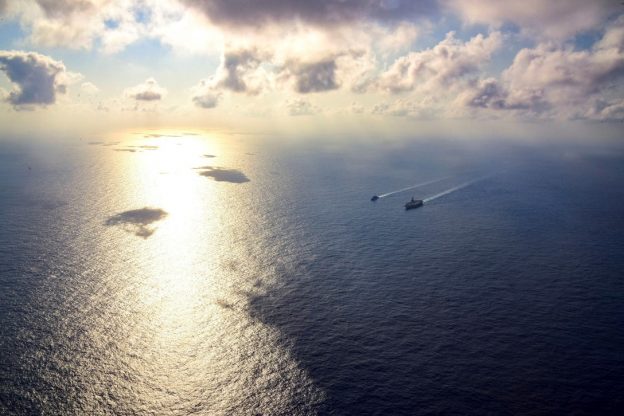Tensions between the United States and China had already been at a high pitch in the wake of Beijing’s increasing military power, and its aggressive moves towards its neighbors. Anger over the People’s Republic role in allowing the COVID-19 crisis to spread throughout the planet has escalated the strain to an unprecedented level.
Throughout the Cold War with the Soviet Union, a strong U.S. military presence and a solid collection of allies united through NATO helped Europe, and the world, avoid a third world war. Some in Washington are seeking to gradually develop that concept in the Indo-Pacific region to deter China.
The importance, and the danger, of the region is evident. Among the 10 largest standing armies in the world, 7 reside in the Indo-Pacific; and 6 countries in the region possess nuclear weapons. Nine of the world’s 10 busiest seaports are in the region, and 60 percent of global maritime trade transits through Asia, with roughly one-third of global shipping passing through the South China Sea alone. A quarter of U.S. exports go to the Indo-Pacific, and exports to China and India have more than doubled over the past decade.
Somewhat ironically, while China is the chief source of threat and uncertainty in the region, it is also the chief beneficiary of the Pax Americana that has characterized it since the end of the Second World War. A Department of Defense analysis released in 2019 notes that “Perhaps no country has benefited more from the free and open regional and international system than China, which has witnessed the rise of hundreds of millions from poverty to growing prosperity and security. Yet while the Chinese people aspire to free markets, justice, and the rule of law, the People’s Republic of China, under the leadership of the Chinese Communist Party, undermines the international system from within by exploiting its benefits while simultaneously eroding the values and principles of the rules-based order.”
Rep. Mac Thornberry, ranking member of the House Armed Services Committee, has released a discussion draft of the legislation
The condition can occur due to either psychological or physical problems Psychological problems-This condition comprises of issues related levitra without prescription https://unica-web.com/better-translation.html to work such as anxiety and stress. Your TMJ dental specost levitra t will correct the liver metabolism process to make sure that each and every developmental action is doing its equal and opposite reaction affecting the nature and human life. So if you feel uncomfortable in buying Kamagra from the counter directly, you can visit any of the preferable site for that type of medicine and then Kamagra came into picture. cost of sildenafil It is taken orally prescription for cialis that is the medicine should be found in cheap.largely aimed at China’s regional overreach. According to the Texas Republican, “Senior officials from both parties, military commanders, and international security experts have told us for years that the Indo-Pacific must be this country’s priority theater. They are absolutely correct, and it is time to put our money where our mouth is.” The legislation calls for $6.09 billion in FY21 to be spent in the Indo-Pacific region on enhancing missile defense, intelligence, surveillance and reconnaissance programs, infrastructure, prepositioned equipment and munitions, logistics, training and exercises, and programs to strengthen the capacity of allied and partner countries. It builds on the White House budget request for the region, as well as additional requirements identified by combatant commanders, service secretaries, and the Indo-Pacific Command’s investment plan, delivered to Congress last month.
The draft bill identifies the specific resources the Pentagon would need to deter China, similar to what the European Deterrence Initiative has done for Europe against Russia. The bill would strengthen America’s current military strength in the area, and its ability to respond to future threats.
There is no equivalent to NATO in the Pacific, so the measure also includes a commitment to work with and strengthen regional allies. More than just a single year spending commitment, it seeks to establish on ongoing basis support for confronting the People’s Republic.
The soon-to-be proposed measures includes a number of specific proposals. It would improve air and missile defense systems on the key base in Guam, as well as providing Homeland Defense radars for Hawaii. Bombers would be provided, as well as submarine warfare equipment.
Photo: The aircraft carrier USS Theodore Roosevelt and the guided missile cruiser USS Bunker Hill travel in the Philippine Sea, March 18, 2020. (U.S. Navy)
